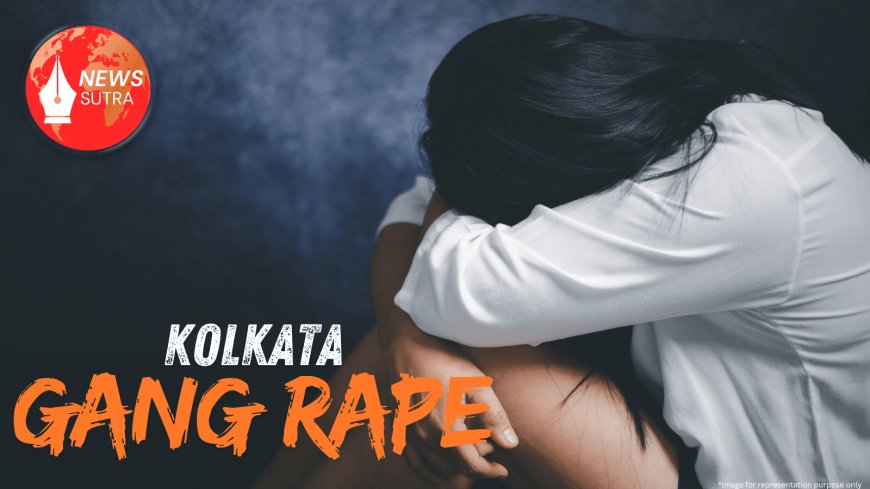Kolkata Gang-Rape Horror: Accused Monojit Mishra Allegedly Dined at Dhaba After Crime, Police Reveal
In the Kolkata gang-rape case, police reveal accused Monojit Mishra dined and drank at a dhaba after committing the crime. Public outrage mounts.

By Ronald Kapper
Published: July 6, 2025
Kolkata – In a disturbing twist to a high-profile gang-rape case that has rocked West Bengal, police officials revealed on Sunday that Monojit Mishra, one of the prime accused, allegedly drank alcohol and ate at a roadside dhaba shortly after the heinous crime was committed. The victim, a 21-year-old college student, was abducted and sexually assaulted in a moving car on the outskirts of the city late Friday night.
The revelation came during custodial interrogation, as investigators retrace the sequence of events following the crime. Mishra, along with two accomplices, was arrested on Saturday after a 12-hour manhunt conducted by the West Bengal CID and local law enforcement units.
Timeline of the Crime
According to the Kolkata Police Crime Branch, the victim was walking home from a friend’s residence near Bansdroni when a vehicle with three men forced her inside. She was reportedly raped by all three men while the car was driven toward the EM Bypass.
Following the assault, the perpetrators dumped the semi-conscious victim near an abandoned construction site close to New Garia metro station, where a passerby alerted the authorities. She is currently undergoing treatment at a government hospital and has recorded her statement under Section 164 of the CrPC.
Accused's Behavior After the Crime
In a chilling detail that underscores the remorselessness of the crime, sources in the West Bengal Police confirmed that Monojit Mishra—the 29-year-old main accused—stopped at a dhaba near Sonarpur along with his accomplices. They allegedly consumed alcohol and had dinner just minutes after abandoning the victim.
“It appears they were under the influence even before the crime, but what is particularly shocking is the casual behavior displayed after the incident,” said a senior investigating officer who requested anonymity.
CCTV footage recovered from the roadside eatery shows the trio laughing and drinking, seemingly unaffected by the brutal act they had just committed. The footage has been sealed as part of the case evidence.
Public Outrage and Political Fallout
The incident has ignited a wave of public anger across Kolkata, with women's rights activists, college unions, and political leaders demanding swift justice. A protest rally was held outside Lalbazar Police Headquarters, where students from multiple universities called for fast-track court proceedings and capital punishment.
The opposition Bharatiya Janata Party (BJP) accused the Trinamool Congress (TMC)-led government of failing to ensure safety for women.
“Another young life has been scarred in Kolkata while the state government remains in denial. Law and order has collapsed,” said BJP spokesperson Sambit Patra.
Meanwhile, the National Commission for Women (NCW) has taken suo motu cognizance of the case and sent a fact-finding team to meet the victim’s family.
Investigation Updates
All three accused—Monojit Mishra, Ritoban Pal, and Jahangir Ali—have been remanded to police custody for 10 days. Forensic teams have seized the vehicle used in the crime and are examining biological samples. The West Bengal State Forensic Science Laboratory (WBSFSL) is expected to submit a preliminary report by mid-week.
Senior officials confirmed that charges under Sections 376-D (gang rape), 365 (kidnapping), and 506 (criminal intimidation) of the Indian Penal Code have been filed.
Investigators are also probing the criminal history of the accused, particularly Mishra, who was allegedly involved in prior cases of assault and intimidation in the Jadavpur area but had not been convicted due to lack of evidence.
Security Concerns and Government Response
West Bengal Chief Minister Mamata Banerjee, responding to the growing outrage, called the incident “deeply painful” and promised that the guilty will not be spared.
“Our daughters deserve to feel safe. I have instructed the police to act with zero tolerance,” she said at a press briefing on Sunday.
In response, the Kolkata Police Commissionerate has announced heightened night patrolling in sensitive zones and is considering launching a women’s safety helpline modeled after Delhi Police’s ‘Shakti’ initiative, as recommended by India Justice Report.
Why This Case Matters
This case echoes the 2012 Nirbhaya gang-rape, highlighting that India’s urban safety for women remains precarious, despite the introduction of stricter laws and special task forces. Criminologists argue that a broken policing ecosystem, delayed trials, and weak conviction rates contribute to such crimes persisting.
A 2024 report by IndiaSpend found that only 31% of reported rape cases in India result in conviction, due largely to evidence tampering and long procedural delays.
Call for Judicial and Legal Reforms
Several women's rights organizations, including Jagori and Sayfty, have called for:
-
Fast-track trial of the accused in special women’s courts.
-
Mandatory mental health counselling and rehabilitation for victims.
-
Greater surveillance and lighting in high-risk public areas.
-
Sensitization training for local police officers on handling gender-based crimes.
The Bar Council of India has also condemned the incident and requested the judiciary to expedite the trial, ensuring that justice is delivered in a time-bound manner.
Conclusion
The Kolkata gang-rape case has once again laid bare the brutal realities of gendered violence in India’s cities. The revelation that the accused behaved casually and dined after the crime adds a chilling psychological dimension to the brutality. While police action has been swift, the public demands not only justice but meaningful systemic reform to ensure that such horrors do not repeat.
As the investigation unfolds, all eyes are on the West Bengal government, the judiciary, and civil society to ensure that justice is not delayed—and certainly not denied.














